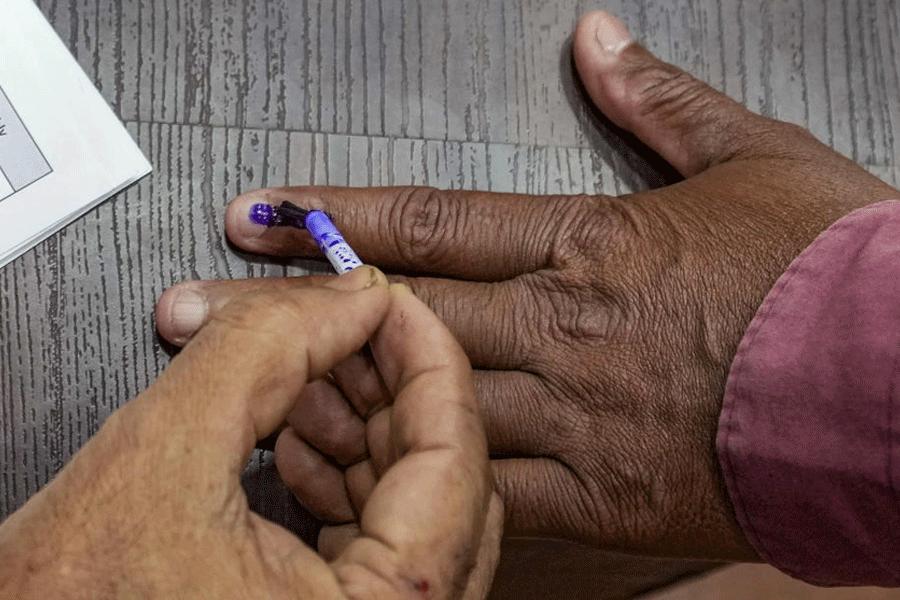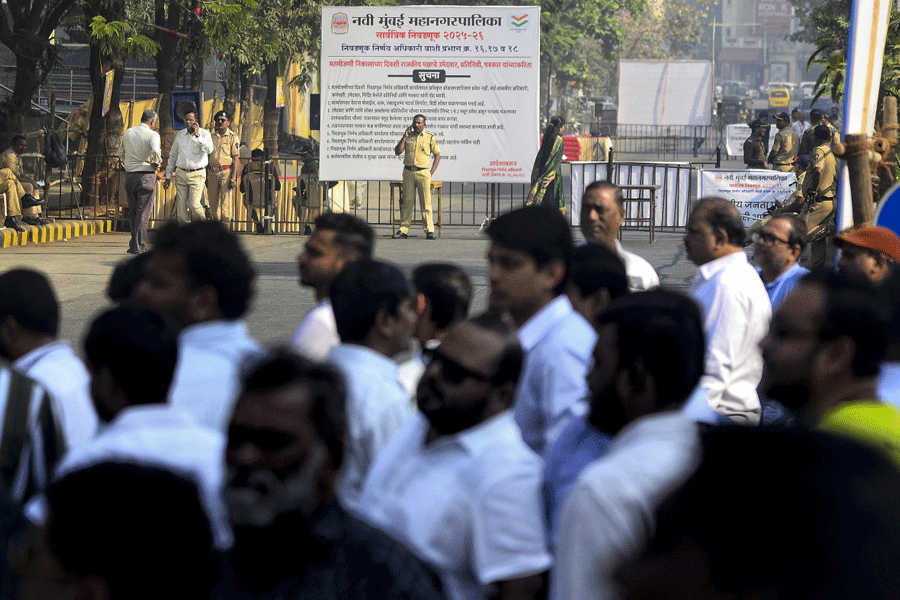|
|
For one evening, placard-holding cardboard condoms were plastered across the otherwise staid-looking iEnergizer office, a call centre on the outskirts of Delhi. The business process outsourcing (BPO) firm had in March announced a competition where employees had to decorate their office space around the theme of AIDS. “The competition was part of a programme to create AIDS awareness,” says Ashish Mittal, vice-president, operations, iEnergizer Inc.
Creativity flowed at the competition. Red ribbons dotted the office. The soft board had sundry stories and newspaper clippings on AIDS-infected people who fought social stigma. A smiling cardboard condom carried a placard that read, “Take control. It’s easy.” Another one instructed, “Be Faithful”.
But a survey of 1,109 iEnergizer employees conducted by Durex Network, the research wing of condom-makers SSL International plc, found that being faithful is not their best quality.
In a sexual attitudes and practice study ? conducted in March, this year ? London-based Durex Network found that 11.1 per cent of iEnergizer employees have had more than five sexual partners. “In contrast, 6.7 per cent of subjects reported having more than five sexual partners in the Durex Sex Survey conducted across India in 2005,” says Peter Roach, vice-president, Durex Network. The iEnergizer survey also revealed that 16 per cent of employees had had a one-night stand and 12.6 per cent an extra-marital affair.
Following the Durex Network study, the New York-based Global Business Coalition ? which works towards spreading AIDS awareness in the corporate sector ? rolled out its “Call Centre Initiative” at iEnergizer. “To begin with, AIDS education has been made part of the company’s induction programme. Other activities are being planned,” says Mittal.
Last month, several companies held a meeting in New Delhi to chalk out steps to combat AIDS in office. “This industry has a young employee base that works odd hours. Men and women live alone and work in close quarters,” says Mittal. “There is reason to believe that their vulnerability to AIDS is genuine.”
Durex Network’s Roach says the study responds to the rising AIDS risk in India’s BPO industry workforce. “India’s call centres have created unprecedented wealth. Such growth challenges traditional society, creating social conditions that can promote HIV transmission,” he says. Roach adds that the Durex study was conducted as a pilot at iEnergizer, in order to develop a suitable prevention campaign that could be adopted across the call centre industry.
Clearly, the Indian call centre industry is waking up to this new BPO-bonding. BPO units are turning into hubs where inter-personal bonding takes place. And often, this bonding takes a sexual turn. A few months ago, hidden cameras placed in a leading Mumbai-based BPO caught a couple having sex in an office cubicle.
A Telegraph-MODE survey conducted in Calcutta, Mumbai, Delhi and Bangalore demonstrates that call centre employees let off steam by holding wild parties and seek physical comfort with the opposite sex. In Mumbai, 89 per cent people polled said they regularly attend wild parties and 74 per cent (55 per cent in Bangalore) said they seek the company of the opposite sex.
Workplace sex is no longer an aberration for people employed in India’s sunrise sector. In March this year, The Times, London, carried a report which quoted figures stating that one in five Indian call centre workers has had an extramarital affair in office. The report added that one in every four BPO employees has casual affairs regularly.
But India’s BPO industry representatives are not convinced. “There are stray instances of sexual misconduct in BPO offices ? probably as many as in any other industry,” says Sam Chopra, president of the Gurgaon-based Call Centre Association of India.
Chopra stresses that the Indian BPO industry is as good or bad a workplace as any. “A young, high-earning work force and a work-by-night routine has created incorrect perceptions about the industry,” says Chopra. He believes that sexually bohemian behaviour is not typical of, or limited to, the BPO industry. “The Indian youth has a changed social and sexual outlook. Since the BPO industry employs large numbers of youth, it comes into the limelight,” he says.
Statistics-wise, the BPO industry is the golden goose of the Indian economy. The industry is growing by 60 per cent per annum, employs 3,48,000 people and is expected to generate $12.2 billion in revenue by the end of this financial year ? up from the $2.4 billion logged in 2002-2003.
But the figures aren’t helping. The monogamous-minded Indian believes BPOs are becoming breeding grounds for adultery and vice. Says Ashok Rau, executive trustee and CEO, Freedom Foundation, a Bangalore-based NGO and counselling centre, “Parents of BPO employees often contact us with complaints that they have no control over their children’s social lives.”
Rau feels the BPO industry’s young work force does not have the intellectual or emotional maturity to handle the job pressures, easy money and the opportunity to be out of the house all night. A survey conducted by the Freedom Foundation among 2,989 BPO and IT sector employees in Bangalore last year found that 38 per cent men and women believed pre-marital sex was permissible and 25 per cent regularly indulged in casual sex. “A call centre office that was visited as part of the survey reported that its drains had been found choked with condoms,” says Rau.
In Bangalore, where call centres abound, women are blas? about their sexual freedom. The city’s three major hospitals ? Sagar Apollo, Mallya and Manipal ? report a 50 per cent increase in two years in the number of women seeking abortion. “Earlier we would get two to three cases in a month. Now we attend to as many in a week,” says Dr Leela Bhagwan, head of gynaecology, Sagar Apollo Hospital. Though abortion is old news, what’s new is the profile of these women ? a majority is 20-plus, single and working in the city’s IT and BPO sector. “They are not guilty about being promiscuous,” says Bhagwan.
For BPO employees ? whose graveyard shift work-routine kills all social contact with the outside world ? life revolves around the office. “Weird working hours means that most friendships happen in office ? and some of them turn intimate,” says Abhijit Pakrashi, who worked as a call centre executive at Accenture’s Bangalore BPO office.
Night shifts and long work hours also mean constant and easy interaction between sexes. “In-house relationships become common in BPO offices, as employees work long hours and barely have a social life outside their workplace,” says Dr Sudha Menon, head of preventive healthcare at Sagar Apollo.
Dr Ali Khwaja, head of the Bangalore-based counselling centre, Banjara Academy, says working by night robs BPO employees of all traditional post-work leisure activities. “They can’t visit a friend, attend a party or unwind at the club. Getting into a man-woman relationship is the most convenient recreational activity for them,” he says.
Emotional loneliness also drives call centre executives into each other’s arms. iEnergizer’s Mittal says 70 per cent of the company’s employees live alone in the city. “A ma- jority have migrated from small towns. They have no friends and family support in the city and live alone. They tend to rush into rela- tionships in a hurry to find companionship,” says Mittal.
 |
Not surprisingly, an estimated 95 per cent women seeking abortions at Sagar Apollo are outsiders to Bangalore. Leela Bhagwan believes that the anonymity of a new city makes women sexually adventurous. “Women lead unnoticed, invisible lives in big cities. There is no fear of being caught,” says Bhagwan.
The identity changes involved in call centre jobs help employees shed their inhibitions, too. Once Subramaniam learns to become Sammy in his workplace, he does the same in his personal space. “BPO employees get used to playing different personalities. This helps them shrug off casual relationships more easily,” says Sudha Menon.
Working in a BPO entails that employees fall in step with a different time zone and culture. They are taught to ape western accents and mannerisms. “Somewhere along the way, they begin aping western values as well,” says Khwaja. BPO employee Aarti Deshpande seconds the stand. “It’s common to find couples walking arm in arm in office corridors and cuddling in the cafeteria. Nobody gives them a second look. Most of us have shed our inhibitions,” she says.
In an industry infamous for short job-stints ? the average attrition rate in the BPO industry is 55 per cent ? employees often develop a short-term attitude to everything in life. Says Aarti Deshpande, a 23-year-old BPO employee, “Many call centre executives feel that since they would be leaving their company within a year, they can do anything at their workplace. They know they can have a casual affair and not carry the baggage for long.”
Age is another factor. The average age of BPO employees is 18 to 25 years, and that’s when the youth are at their rebellious best. “This is the time when youth like to experiment with everything from hairdos to sex. Making money at this age adds momentum to their sensation-seeking streak,” says counsellor Khwaja.
The high work pressures of BPO jobs ? call centre executives need to maintain hourly deadlines ? also lead to fly-by-night flings. Freedom Foundation’s survey found that Bangalore’s BPO employees like to drink to de-stress. Nineteen per cent of the 49 per cent of people who said that chilling out with a few drinks was normal were women. Of these, 15 per cent women said their first sexual encounter happened under the influence of alcohol. “Going to pubs and parties is a common social pastime for BPO employees in Bangalore,” says Rau.
Work hard and party hard is a way of life at BPO offices. Says Akshay Prasad, a call centre executive at a leading BPO firm in Bangalore, “We work under high pressure and are rewarded with regular parties in office and social outings. Everybody lets their hair down at office parties. I’ve seen a lot of romances blossom at these parties.”
Surya V. Ciryam, human resources head of the Bangalore-based medical transcription firm, Spheris India, agrees that social events are an integral part of the BPO work culture. “But these events are driven towards releasing work stress,” he says.
Ciryam feels the BPO industry is being unfairly targeted for fostering casual relationships. “Social values have changed across the board. A youth doesn’t have to work with a BPO to believe in casual flings,” he says.
The Durex Sex Survey, 2005 ? conducted across India ? found that 50.4 per cent of the subjects encouraged sexual abstinence. iEnergizer employees think different. Only 13.1 per cent voted for abstinence.
TELEGRAPH-MODE SURVEY
Has your outlook towards sex changed after joining the BPO industry?
Calcutta Yes: 16%
Mumbai Yes: 78%
Delhi Yes: 40%
Bangalore Yes: 19%
In office, do you talk about sex with colleagues of the opposite sex?
Calcutta Yes: 32%
Mumbai Yes: 50%
Delhi Yes: 50%
Bangalore Yes: 22%
Do you party to let off steam?
Calcutta Yes: 12%
Mumbai Yes: 89%
Delhi Yes: 44%
Bangalore Yes: 77%
Do you seek physical comfort from colleagues of the opposite sex?
Calcutta Yes: 12%
Mumbai Yes: 74%
Delhi Yes: 28%
Bangalore Yes: 55%
Do you believe in safe sex?
Calcutta Yes: 52%
Mumbai Yes: 78%
Delhi Yes: 100%
Bangalore Yes: 97%











